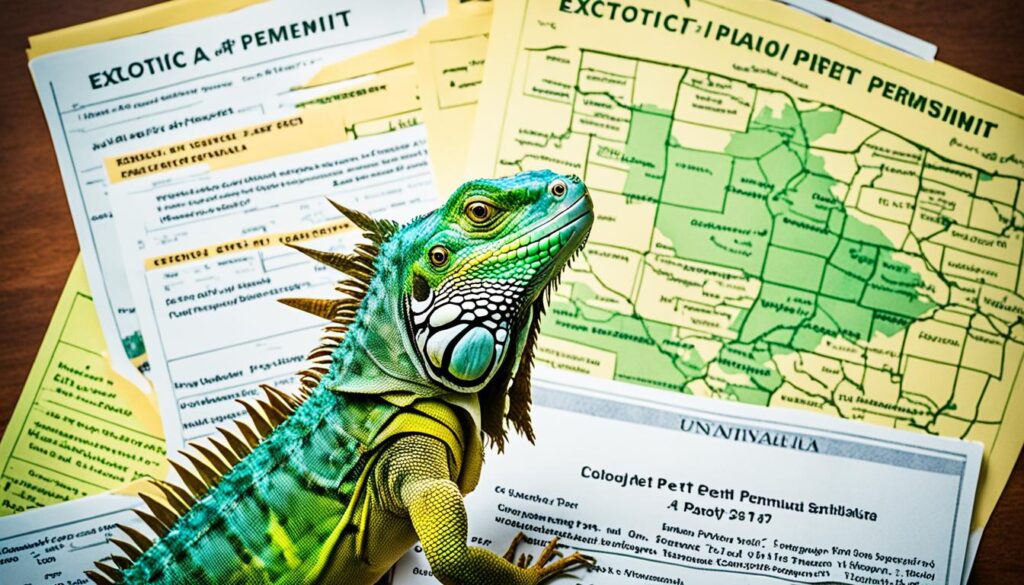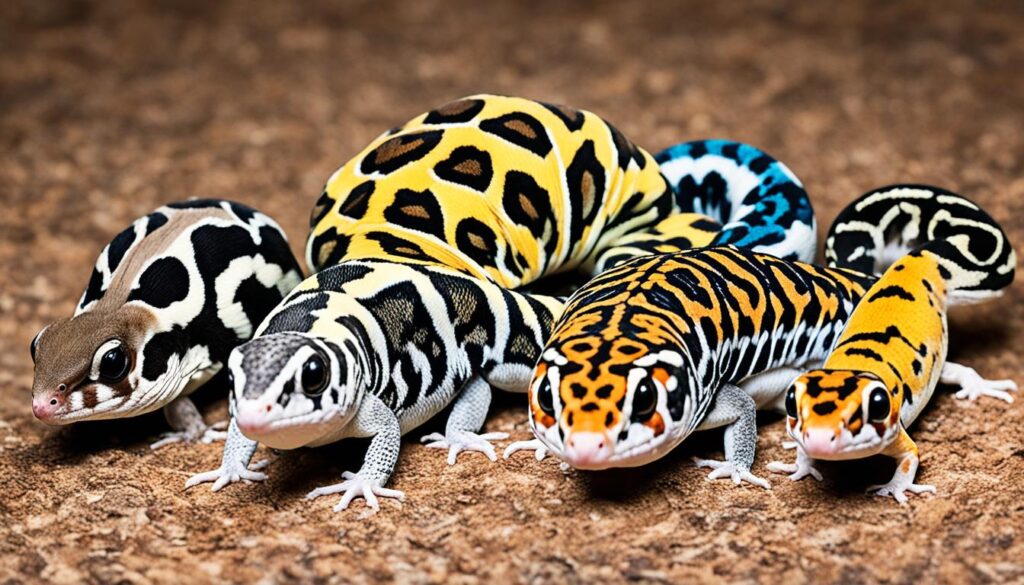In Pennsylvania, many people choose unique and exotic pets for companionship. While most exotic pets are banned for safety and environmental reasons, some can be kept legally with permits. The state’s rules, set by the Pennsylvania Game Commission, U.S. Department of Agriculture, and U.S. Fish and Wildlife Service, let people have hedgehogs, non-venomous reptiles, and ferrets without a permit.
But, for animals like bears, wolves, coyotes, and big cats, you need a permit. To get this permit, you must show you’ve had two years of experience caring for the animal. This includes its diet, handling, training, and keeping it safe. The permit costs $50 a year.
Having an exotic pet in Pennsylvania takes a lot of research, time, and money. But, for those who are ready for the challenge, it can be very rewarding.
Key Takeaways
- Pennsylvania allows the ownership of certain exotic pets, including hedgehogs, non-native venomous reptiles, and ferrets, without a permit.
- More dangerous or regulated species, such as bears, wolves, coyotes, and large felines, require a permit to own in Pennsylvania.
- Obtaining an exotic pet permit involves demonstrating two years of hands-on experience with the animal’s care and handling, as well as an annual $50 fee.
- Owning an exotic pet in Pennsylvania requires significant research, time, and financial commitment to navigate the legal requirements.
- Pennsylvania’s exotic pet laws are enforced by the Pennsylvania Game Commission, U.S. Department of Agriculture, and U.S. Fish and Wildlife Service.
Understanding Pennsylvania’s Exotic Pet Laws
Dealing with exotic pet laws in Pennsylvania can be tough for those wanting to own them. The state has a detailed system for handling these unique animals. This involves the Pennsylvania Game Commission, U.S. Department of Agriculture, and U.S. Fish and Wildlife Service.
Overview of Regulations
In 2021, a total ban on exotic pets was suggested, but now, Pennsylvania has a permit system for some species. The state’s exotic pet laws cover a broad range of animals, from bears and coyotes to lions, tigers, and their hybrids. Anyone with more than one exotic animal must get the right permits.
Responsible Ownership Requirements
To own an exotic pet in Pennsylvania, you need the right permits and to show you can care for the animal well. This means having at least two years of experience with the species and paying an annual $50 fee. Breaking the state’s exotic pet laws can lead to fines and even losing your permit and the animals.
“Maintaining suitable environments for exotic pets in Pennsylvania is challenging, especially due to the climate and space requirements, making it more feasible for zoos rather than private citizens to meet these needs.”
It’s crucial to understand and follow pennsylvania exotic animal laws if you want an exotic pet. Not doing so can lead to big legal and ethical problems. This highlights the need for responsible pet ownership and the welfare of these animals.
The Tiger King Saga: A Cautionary Tale
The story of Joe Exotic, a big cat zoo owner, is a famous case in Pennsylvania. It was featured in the Netflix series “Tiger King.” This story warns us about the dangers of keeping wild animals as pets, even with the right permits.
“Tiger King” became a hit during the COVID-19 pandemic, showing the weird side of exotic pets. It focused on Joe Exotic, who got 21 years in prison for a murder plot against Carole Baskin. This case shows why we need strict rules and careful pet ownership to keep everyone safe.
Another warning about exotic pets happened in 2011 in Zanesville, Ohio. Terry Thompson had a farm with 56 exotic animals, like tigers and bears. When he died, the animals escaped and 18 tigers and others were killed. This event made people talk about the problems of owning exotic animals.
| Exotic Pet Ownership Controversy | Key Insights |
|---|---|
| The “Tiger King” Saga |
|
| The Zanesville, Ohio, Incident |
|
| Mike Tyson’s Tiger Ownership |
|
The “Tiger King” saga and other stories show we need better rules for exotic pets in Pennsylvania. These stories warn us of the risks and challenges of having wild animals as pets, even with permits. It’s important for lawmakers and authorities to focus on keeping animals and people safe.
what exotic pets are allowed in pa
In Pennsylvania, owning exotic pets has rules based on the type of animal. Some pets like hedgehogs, non-venomous reptiles, and ferrets are okay without a special permit. But, animals seen as more dangerous or controlled need a permit from the Pennsylvania Game Commission.
Permitted Exotic Pets Without a Permit
- Hedgehogs (when purchased in-state)
- Non-native venomous reptiles (e.g., boas, pythons, anacondas)
- Ferrets
Exotic Pets Requiring a Permit
To keep pets like bears, wolves, coyotes, and big cats, you must get a permit. You need to show two years of experience in caring for these animals. This includes their diet, handling, training, and living conditions. Plus, there’s an annual $50 fee.
Before getting an exotic pet in Pennsylvania, make sure to check the laws and what’s needed. Exotic Pet Wonderland has lots of info on what’s legal for pets in the state.
“Owning an exotic pet is a big responsibility. It’s key to know the laws and what the pet needs before bringing it home.”
Obtaining an Exotic Pet Permit in Pennsylvania
If you own exotic pets in Pennsylvania, getting a permit is key. You need to reach out to the Pennsylvania Game Commission’s Special Permits Enforcement Division. They will tell you what you need for the pet you want.
Permit Application Process
You must show you’ve had at least two years of experience with the pet’s care. This includes feeding, handling, training, and keeping it healthy. You also need to meet the state’s rules, like having the right enclosures and proof of vet care and insurance. The cost for an exotic pet licenses pa permit is $50 a year.
Eligibility Criteria
- Demonstrate at least 2 years of hands-on experience with the designated species
- Provide proof of proper enclosures, veterinary care, and liability insurance
- Pay the annual $50 permit fee
By going through the how to get exotic pet permit in pa process, you make sure you follow the law. You also make sure you can give your exotic pets the best care possible.

Caring for Exotic Pets: Responsibilities and Challenges
Owning an exotic pet in Pennsylvania means you face big responsibilities and challenges. Caring for these unique animals needs special knowledge, resources, and a lot of time. They have different needs for food, homes, and environments than regular pets.
Handling and caring for these animals can also be risky, so you need special training and safety steps. If you want an exotic pet, be ready to spend more on vet care. This care can be pricier and harder to find than for common pets. Exotic pet ownership is a big deal, and you must be ready to give your pet the best care possible.
| Exotic Pet Ownership Responsibilities | Challenges of Owning Exotic Pets |
|---|---|
|
|
If you’re thinking about getting an exotic pet, think hard about these exotic pet care requirements and ownership responsibilities. The challenges of owning exotic pets are big, and not being ready can hurt the animal or even lead to legal trouble for you.
“Exotic pet ownership is not for the faint of heart. It requires a deep understanding of the animal’s needs, a willingness to invest substantial resources, and a lifelong commitment to providing the best possible care.”
Statistics on Exotic Pet Ownership in PA
The number of exotic pets in Pennsylvania has been rising. From 2015 to 2019, the state’s Game Commission issued more exotic pet permits. This shows more people want unique pets, even with the rules and duties that come with exotic pet ownership.
Most homes in Pennsylvania have dogs or cats, but exotic pets are gaining fans. As these pets become more popular, it’s important to find a balance. This balance must consider public safety, animal welfare, and people’s wishes to have these special pets.
| Year | Exotic Pet Permits Issued |
|---|---|
| 2015 | 123 |
| 2016 | 158 |
| 2017 | 187 |
| 2018 | 201 |
| 2019 | 220 |
The exotic pet ownership statistics in Pennsylvania are changing. The state’s rules and public knowledge will be key. They will help make sure these pets are treated right and with care.
Zoning and Local Regulations for Exotic Pets
When thinking about getting an exotic pet in Pennsylvania, you need to look at both state and local laws. Some places have their own rules that might be different from the state’s. It’s important to check the zoning laws for exotic pets in where you live.
Also, the residential restrictions for exotic pets in pa matter. Some areas don’t allow certain exotic pets. It’s key to know these rules before getting an exotic pet in Pennsylvania.
Municipal Ordinances
Many places in Pennsylvania have their own rules for exotic pets. These local regulations for exotic pets in pennsylvania might include:
- Specific requirements for housing and enclosures
- Limits on the number of exotic pets allowed per household
- Mandatory registration or licensing procedures
- Restrictions on certain species deemed too dangerous or unsuitable for private ownership
Residential Zoning Considerations
The zoning of your property can affect exotic pet ownership. Some areas don’t allow certain pets because of space or noise concerns. Make sure to check the zoning laws for exotic pets in pa where you live before getting an exotic pet.
“Navigating the complex web of state, local, and zoning regulations is essential for anyone interested in owning an exotic pet in Pennsylvania.”
| Regulation | Details |
|---|---|
| Exotic Animal Ownership Permit | A $25 annual permit is required for each exotic animal in Pennsylvania, with the application due by January 5th of that year. |
| Prohibited Species | Certain animals, such as primates, large cats, wolves, and bears, are prohibited from private ownership in Pennsylvania without a special permit. |
| Penalties for Violations | Violating the exotic animal ownership regulations can result in a fine of up to $300 and up to 90 days in jail. |
Ethical Considerations in Exotic Pet Ownership
Owning an exotic pet in Pennsylvania comes with big ethical questions. These questions are about how to treat these animals right. Many exotic pets need a lot of care that’s hard to give in a home, even with great effort.
There are also worries about how owning these pets affects their wild friends. The pet trade can hurt the numbers of these animals in the wild. If you want an exotic pet in Pennsylvania, you must think about these issues. You need to be ready to care for your pet for its whole life.
- Exotic pets like lions and tigers are dangerous because they are wild.
- Domestic pets like dogs and horses can also be risky, but they are less likely to be aggressive.
- Dogs are the most common pets and can sometimes hurt people because they are so common.
It’s very important to take good care of exotic pets for their health and happiness. This makes us wonder if owners can really take care of their pets’ needs.
“The argument exists that keeping wild animals as pets distorts their natural function and violates their intrinsic nature, suggesting a moral concern about owning exotic pets.”
Keeping endangered species as pets can start big debates about saving these animals and how captivity affects them. Cases like Baughman v. City of Elkhart, TX, Barnes v. City of Anderson, Coroneos v. Montgomery County, and Commonwealth v. Reynolds show the tricky legal and ethical parts of owning exotic pets.

Deciding to own an exotic pet in Pennsylvania means understanding the big ethical questions. You also need to promise to take care of the animal’s welfare for its whole life.
Resources for Prospective Exotic Pet Owners
If you’re thinking about getting an exotic pet in Pennsylvania, there are many resources to help you. The Pennsylvania Game Commission’s Special Permits Enforcement Division is a great place to start. They can give you info on permits and how to apply. Local animal control and exotic pet groups can also help with care and handling tips.
Online forums and educational sites are great for learning more about exotic pets. These places are full of advice from people who already have these pets. You can find info on setting up the right habitat, what to feed them, and how to keep them healthy.
It’s key to use these resources for exotic pet owners in pennsylvania before getting a pet. They help you understand the care and legal aspects of owning an exotic pet. With this info, you can decide if you’re ready for the challenge of caring for an exotic pet long-term.
- Pennsylvania Game Commission’s Special Permits Enforcement Division
- Local animal control agencies
- Exotic pet organizations
- Online forums and educational websites
“Owning an exotic pet is a big responsibility, and it’s crucial to do your research and make sure you can provide the best possible care. These resources can help you navigate the legal requirements and ensure you’re prepared for the challenges of exotic pet ownership.”
Conclusion
Owning an exotic pet in Pennsylvania is a big task. It needs careful thought and following the state’s laws. Some pets like hedgehogs and non-venomous reptiles can be kept without a special permit. But, dangerous pets like bears and big cats need a permit from the Pennsylvania Game Commission.
This permit shows you have the right experience and meet certain requirements. Owners must also think about local laws and where they live. These rules might affect how they care for their exotic pets.
Before getting an exotic pet, it’s key to look into the needs and challenges. This helps make sure you’re ready for the responsibility. Knowing about exotic pets in Pennsylvania shows how important it is to be well-prepared before bringing one home.
FAQ
What exotic pets are allowed in Pennsylvania?
In Pennsylvania, owning certain exotic pets is legal. You can have hedgehogs, non-venomous reptiles, and ferrets without a permit. But, animals like bears, wolves, coyotes, and big cats need a special permit from the Pennsylvania Game Commission.
What are the requirements for obtaining an exotic pet permit in Pennsylvania?
To get an exotic pet permit in Pennsylvania, you need two years of experience with the animal’s care. You must also meet state eligibility criteria. This includes having proper enclosures, veterinary care, and liability insurance. The permit costs a year.
What is the "Tiger King" saga, and how does it relate to exotic pet ownership in Pennsylvania?
The “Tiger King” saga is about Joe Exotic, a big cat zoo owner in Pennsylvania. His story was on Netflix. It warns about the dangers of keeping wild animals as pets, even with permits.
What are the ethical considerations involved in owning an exotic pet in Pennsylvania?
Owning an exotic pet in Pennsylvania brings up big ethical questions. These animals have special needs that can be hard to meet in captivity. There’s also worry about how it affects their natural habitats. Owners must think hard about caring for these animals for their whole lives.
What resources are available for prospective exotic pet owners in Pennsylvania?
For those thinking about exotic pets in Pennsylvania, there are resources to help. The Pennsylvania Game Commission’s Special Permits Enforcement Division can give info on permits and how to apply. Local animal control and exotic pet groups offer advice on caring for these animals. Online forums and educational sites also have lots of information on the responsibilities of owning exotic pets.



